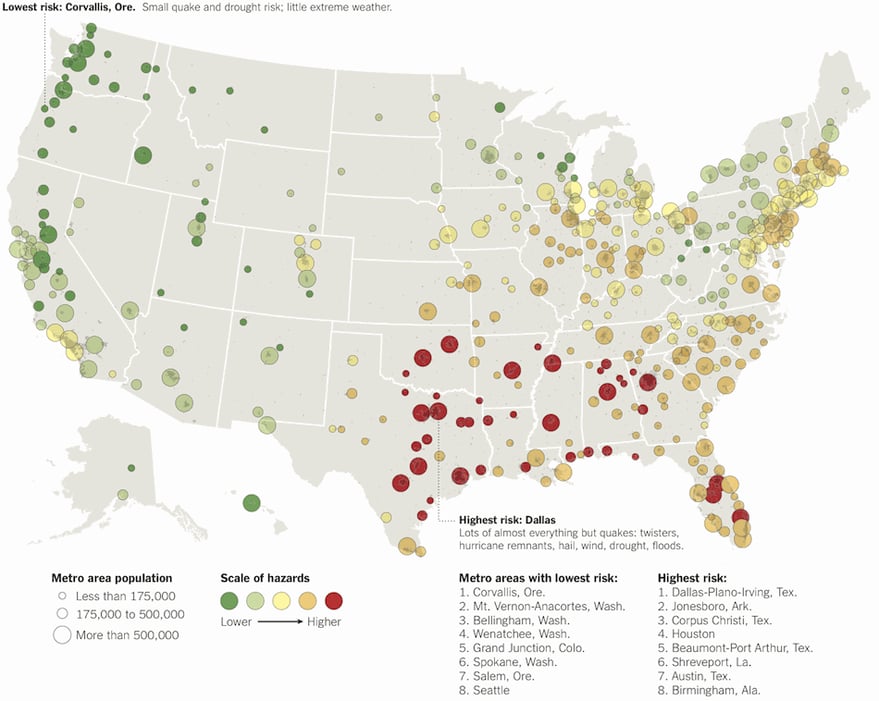With fuel retail being a competitive industry, understanding customer behavior is crucial for staying ahead of the game. Selling fuel is not just about offering a product; it's about creating a positive experience for customers and meeting their needs, even when they might be in a bad mood. Learn more about the psychology of selling fuel to customers in a bad mood, drawing insights from the article "How to Sell Fuel to People in a Bad Mood" by NACS Magazine.
Preparation: The Only Defense Against Disasters
Know Your Location’s Risks
Different parts of the country face different kinds of disasters. The top five states with the highest exposure to multiple natural hazards are Florida, Rhode Island, Louisiana, California, and Massachusetts. While Michigan, West Virginia, New York, North Dakota and Vermont are the least likely to be hit by a natural disaster. Here are where many of the disasters are most likely to occur within the United States:
In California, you are more likely to experience earthquakes and wildfires, while in Florida you are more likely to suffer from hurricane winds and storm damage along the Atlantic and Gulf coastlines, sinkholes, and flooding. It is important to look up your locations potential risks and formulate a plan based on what disasters may occur.
Think Ahead and Make a Plan
Creating a plan is critical in protecting your business. Not only do you need to know where to go for safety, you must also know how to evacuate your store during an emergency. Websites like Ready.gov are great resources with different plan templates that you can use to create your c-store’s emergency plan.
One of the best ways you can protect your employees is by educating them. Purchase a battery-powered AM/FM radio with extra batteries and make sure every employee knows where it is located and how to use it. It is also a good idea to have all the local news stations written down in multiple locations in an area close to a radio. Also, having access to a cell phone is important to staying informed when an emergency occurs.
Next, you want to figure out the best ways for your employees and customers to protect themselves depending on the emergency:
- In the event of a fire, have an evacuation plan posted in multiple locations with a central meeting point outside.
- When an earthquake or tornado occurs stay where you are, drop down onto your hands and knees, and cover your head and neck with your arms.
- If there is a power outage turn on flashlights and make sure that all employees are accounted for.
After an emergency check all bathrooms and other store areas when you are safely able to. If a customer has been injured call 911 and try not move them especially if it is a head, neck, or back injury. Researching and informing your employees will help to prevent injuries and store loss during an event.
During an emergency make sure you do not surge your store prices on items customers may need. This may be an easy way to increase profits temporarily, it could hurt you in the long run. Many customers may resent you and choose to go to other competitors after the crisis has passed. If you want to gain customers and enhance your c-store's reputation you can offer your customer free coffee or water during an emergency. You can also place donation buckets near the register to support your community, or donate a percentage of all sales to a disaster relief fund.
Disaster Proofing and Protecting Your Store
Before an emergency occurs prepare your store with everything you may need during or after a disaster, in the event of an emergency, clearly, post the address of your store near the phone with a 911 label. Also, write down where the emergency pump switches, main water shut off and fire extinguishers are located and keep this in an easily accessible place. Even with lots of preparation, sometimes the simplest things are forgotten in a moment of panic so write down any important information.
Your store should also have smoke and carbon monoxide detectors. Frequently check these and make sure that they working and have full batteries. It is also smart to make sure you have a backup cell phone battery that is charged and a waterproof, fireproof lock box where you keep all your important papers. Consider investing in a backup generator for power so that you can keep registers and coolers operating and continue to make sales during power outages. This will also save you money by preventing perishable merchandise from being ruined.
The best thing you can do is to protect your c-store is to continue to maintain and practice your emergency plan. Continually stock disaster relief items and educate new and existing employees on your plan for your c-store before, during, and after a natural disaster.

![iStock-479777862-e1487347167617[1]](https://blog.goebt.com/hubfs/iStock-479777862-e1487347167617%5B1%5D.jpg)



